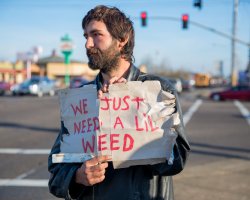We MUST Teach Our Young People: DEATH is a Side Effect of Drug Abuse

A person in his (or her) teens or early 20s, has his whole life ahead of him. All the promise of his future burns bright. Unfortunately, many young people are misled by lies about how much “fun” drug abuse will be and how harmless it all is. For thousands of young people every year, these lies end their lives before they even have a chance to reach maturity.
We all know that young people usually have a sense of invincibility. Most have not yet witnessed death, serious illness or the devastation that can result from drug abuse or excessive alcohol use. When they begin to experience this devastation in their own lives, they may already be addicted and need help extricating themselves from that trap. They may not see the danger until it is too late for them to save themselves.
According to the Centers for Disease Control and Prevention, alcohol plays a role in the deaths of 4,358 young people under 21 every year. These deaths include:

- 1,580 deaths from motor vehicle crashes
- 1,269 from homicides
- 245 from alcohol poisoning, falls, burns, and drowning
- 492 from suicides
The National Institute on Drug Abuse points out that 4,235 young people (ages 15-24) lost their lives to drugs or alcohol in 2015. The numbers shake out like this.
- Male 2,977
- Female 1,258
- Heroin and other illicit opioids 2,343
- Cocaine 442
- Benzodiazepines (anti-anxiety drugs) 665
- Pain relievers 886
How Will Your Loved Ones Learn about Drugs?
Teens and young adults will not learn the truth about drugs from their friends and certainly not from those offering or selling drugs. They will only learn it from their teachers, parents and other trusted adults. If you are assisting young people in growing up, make sure they understand the risk of losing their sobriety, productivity and even their lives to drugs. Narconon International can help you with this job. We have dozens of educational articles available to you. Use the links below to learn what you need to know to provide your children with factual information about the risks.
How to tell when alcohol use has become excessive and harmful.
How to identify marijuana use and the risks involved in its use.
Spotting prescription drug abuse.
Signs of cocaine use and its dangers.
The perils of MDMA (Ecstasy) use.
Never Take their Sobriety for Granted
As teens get older, parents tend to drop their vigilance as they loosen their supervision and regulation of these young people. While this is understandable and is a natural step in allowing a person to mature into adulthood, when there are suspicions of drug use or excessive alcohol use, vigilance must once again kick into high gear. Signs of drug use must not be overlooked. Excuses that ring a little hollow must not be accepted. Events that don’t quite make sense should be checked out. Like if you hear these excuses:
“My tuition went up again and I need more money.” Verify with the school.
“I lost my wallet with my rent money in it.” Why is the person carrying rent money in cash? Sit down with them and look at their bank statements.
“My dog got hurt and needs surgery.” Go look at the dog or have someone nearby do so.
“I owe someone money and they are threatening me.” Or “I lost my job/failed my class because my boss/teacher hated me.” Go take a close look at the person, his health, how he’s eating, what shape his possessions are in. That will give you a good idea of the condition of his life. If they are very rough, you have the evidence you need to dig deeper to determine what’s going wrong in this person’s life (which might be drug abuse or some other catastrophic event).

It’s so much more pleasant to be loving, trusting and supportive. But you must know when to change gears to prevent the destruction of a person’s future, hopes and even their life. It starts with your own education on drugs and addiction and the education of your teens. Even with young adults, you can still initiate conversations that could save their lives.
And if someone you care about has already lost their way to drugs or alcohol, call us at 1-800-775-8750. For fifty years, we have been leading the addicted back to the productive, enjoyable lives they dreamed of while addicted. We can help.


 ®
®